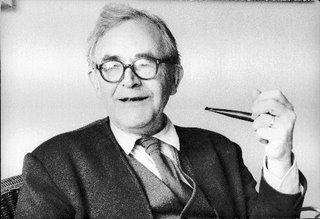
The next paragraph of the previous entry (with one more to follow). This one contains my favorite Barthian quote (alas not an actual quote of Barth):
Everything depends on noticing that Barth is attempting to think this matter through concretely rather than abstractly in his special (actualist) sense of terms. Everything depends, therefore, on seeing that he does not think in terms of the real and the ideal, but rather in terms of the real and the unreal (or of the possible and the impossible). What is real, possible, and concrete is what God has established in Jesus Christ. In Jesus Christ we see that God does not exist without humanity and that humanity does not exist without God. God without humanity and humanity without God are conceived as abstractions that do not really exist in the sense that they have no ultimate reality. God does not exist without humanity, because God has decided in Jesus Christ not to be God without us. Likewise, humanity does not exist without God, because Jesus Christ has decided in our place and for our sakes not to be human without God. Everything else about us, as noted more than once before, is regarded as an abstraction that is destined to disappear. By virtue of an existential encounter with God, our old situation (abstract, unreal, and impossible as it is) can and should be left behind even now. The salvation which as such was already true and actual for us in Christ thereby becomes true and actual in our own lives as well. What was already effective and significant de jure becomes effective and significant de facto (however provisionally) here and now.
--George Hunsinger, How to Read Karl Barth, pp. 153-4.

No comments:
Post a Comment